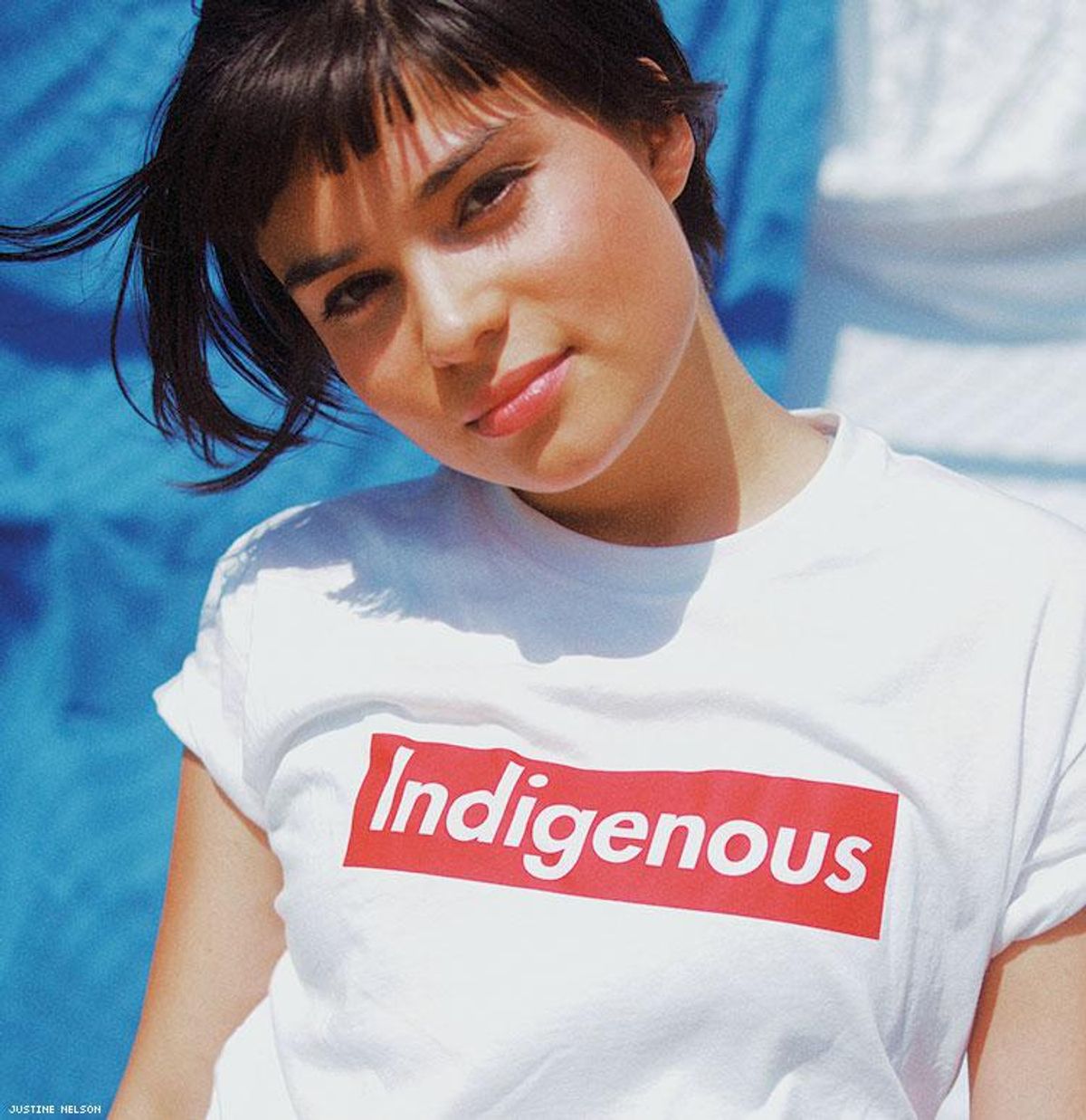On the second season of American Gods, the Amazon/Starz series based on author Neil Gaiman's novel, one face stands out: actress Devery Jacobs. Playing the feisty Sam Black Crow, Jacobs is representing something rare in Hollywood, as she and her character are both queer and First Nations.
Born and raised in Kahnawa:ke Mohawk Territory, which straddles the U.S. and Canadaian borders, Jacobs (@KDeveryJacobs) grew up reenacting Disney movies and starring in summer plays at the Turtle Island Theatre Company. She later studied to be a counselor and worked at the Native Women's Shelter of Montreal.
Her first big acting break came as the lead in 2013's award-winning film Rhymes for Young Ghouls, followed by two television shows, Cold on go90 and This Life on CBC, and another film, The Sun at Midnight, for which she won best actress at the American Indian Film Fest. This year, she hit the big time.
In addition to Gods, Jacobs is also starring in the campy Netflix original series, The Order, about a secret society, werewolves, and the dark arts; as well as in season 3 of Canada's addictive crime drama, Cardinal, and two upcoming films, The Road Behind and The Lie. In the latter, produced by Blumhouse Productions, Jacobs is in the catalyst role of Brittany opposite Peter Sarsgaard and Mireille Enos.
Named one of Canada's Rising Stars in 2017 by The Hollywood Reporter and a TIFF Rising Star at the 2018 Toronto International Film Festival, Jacobs is also currently producing the film adaptation of the best-selling novel So Far From God. But none of this detracts from her activism. She was the original founder of the Kahnawa:ke Youth Forum, where she led and organized protests and rallies. She was also an active participant in the Idle No More Movement. Most recently, Devery has been focusing on activism through her art, to alter how Indigenous people are seen.
The Advocate: I'm mixed-race Zuni/Choctaw. What is it like to be a queer actress representing queer First Nation and two-spirit folks in Hollywood?
Devery Jacobs: A fellow Onkwehon:we!* We're taking over. I was such a fan of Neil Gaiman's book and especially of Sam Black Crow. Not only are contemporary Indigenous people rarely represented onscreen, but also female-identifying queer characters -- it's lightning in a bottle. There are so few opportunities to bring all sides of myself to a character, my identity and sexuality to screen... [I] wanted to bring my truth and perspective as a Mohawk queer womxn to Sam, ensuring I represent my community properly.
How do you feel about queer actors playing nonqueer roles, cis actors playing trans roles, white actors playing Native roles and visa versa? Since the birth of film, there has only been misrepresentation for every community. Bi people of color and LGBTQ+ people were never granted the opportunity to share their perspectives in the medium and so white, cis-het actors played their idea of what that experience would be like. I believe that now is the time to tell our truths, our stories, and experiences by casting accordingly, and by hiring diverse creatives behind the lens.
Tell me about Sam. Sam is both cynical and inquisitive, guarded and tender. Sam is a bit of a wandering soul. She is sarcastic with some firm beliefs, but is also very curious about life and about Shadow Moon, which is why she lets him hitch a ride. Shadow and Sam find a comfortable kinship between them, both being mixed-race in a very white America, and both dealing with girl troubles. Audiences get to see a softer side to Shadow for the very first time, and take a peek into what Sam's life as a two-spirited half-Cherokee looks like.

What attracted you to the series? What I love about the book, and series, is that it tells the clashing of immigrants coming to this country and each of their beliefs.
Critics say you're one of the best parts of The Order. How's that feel? Well nia:wen, thank you! I had so much fun on The Order and I'm thrilled to see how responsive fans have been. Playing Lilith, or should I say "Killith," was one of my first opportunities to venture into comedy, and being a part of the Knights of St. Christopher was just the best time. My favorite aspect of The Order is that it doesn't take itself too seriously and relies heavily on comedic dialogue. I'm crossing my fingers that we go for season 2. What's so funny is that I keep being cast in these tough roles, like both Sam and Lilith, but in actuality I'm a pretty shy geek. Like, if I were a character in The L Word, I would 100 percent be Dana.
Only a few Native or Indigenous actors are celebrated in mainstream Hollywood. Adam Beach, Graham Greene, and Irene Bedard--. Who did you look to? A blend of Indigenous and non-Indigenous creatives. I deeply admired the Abenaki documentary filmmaker Alanis Obomsawin's work, and drew a lot of inspiration from Natalie Portman's career. Now my idols are Taika Waititi [Korg, Avengers: Endgame] and Sacheen Littlefeather.
You have a different take on citizenship. I don't identify as Canadian. I'm Kahnawa:ke (Mohawk), which is a part of the Haudenosaunee (Iroquois) Confederacy -- and our territory extends over both the Canadian and American... side[s] of this fabricated border.
*"original peoples" per @mohdictionary




















































































Fans thirsting over Chris Colfer's sexy new muscles for Coachella